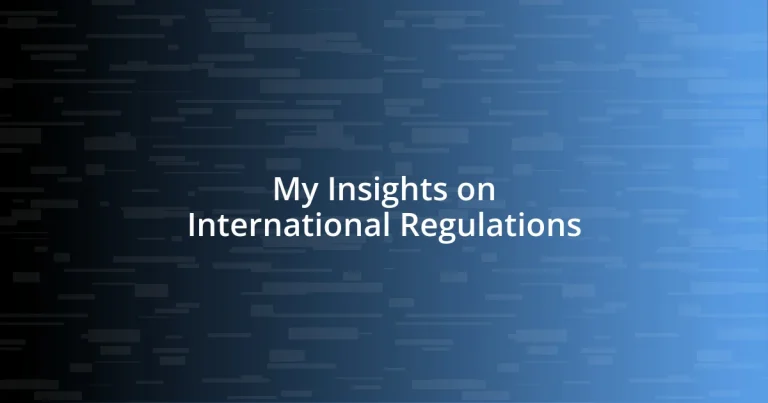Key takeaways:
- Understanding international regulations is essential for businesses, as compliance builds trust and facilitates market expansion, while also addressing cultural differences in enforcement.
- Key international regulatory bodies like the WTO and ISO establish critical standards that ensure effective governance and foster global economic stability.
- The future of regulations will increasingly rely on technology for compliance management, along with greater transparency and stakeholder engagement in regulatory processes.
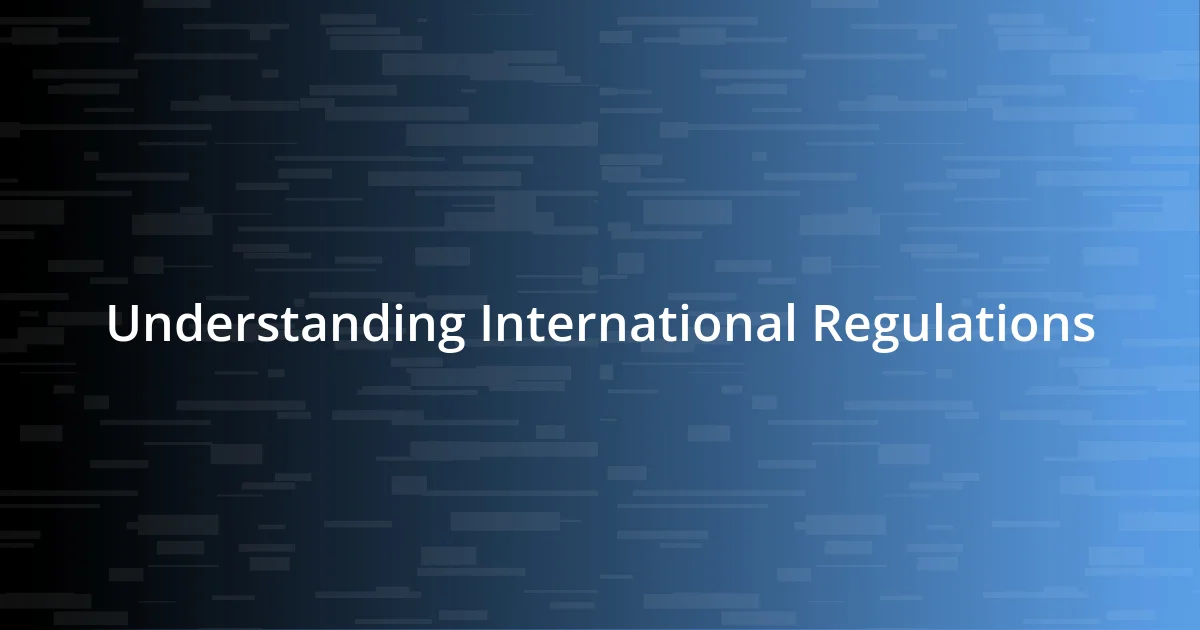
Understanding International Regulations
Understanding international regulations can feel overwhelming at first, especially when trying to navigate the complex tapestry of laws and agreements that govern cross-border activities. While researching this topic, I often found myself wondering how these regulations affect everyday businesses and transactions. I remember a time when I was involved in a project that spanned multiple countries; it was enlightening to see how different jurisdictions approached trade, environmental protections, and labor rights.
One thing I’ve realized is that international regulations are designed to create a level playing field. They try to address discrepancies between countries and safeguard against exploitation. For example, I once attended a seminar where industry leaders discussed how these regulatory frameworks help protect consumers and workers alike, yet the nuances of each region often led to lively debates. Isn’t it fascinating how one regulatory decision in one part of the world can ripple through economies and impact individuals in ways we often overlook?
As I delved deeper into the subject, I was struck by the intrinsic link between culture and regulatory environments. Different values and societal norms often shape how regulations are formed and enforced. I can recall a moment during a conference when a speaker highlighted the importance of local context, saying, “A regulation that works in one culture may not make sense in another.” It made me reflect on how adaptability and understanding of local environments are crucial for those looking to engage on an international scale. How do you perceive the balance between respecting local customs and adhering to global standards?

Importance of Compliance in Business
Recognizing the importance of compliance in business is crucial for long-term success. I remember the time I was working with a small company that overlooked certain regulations because they thought the risks were minimal. Unfortunately, a minor compliance issue escalated into a significant legal challenge, leading to not just financial loss but also damage to their reputation. This experience taught me that compliance isn’t just about avoiding penalties; it’s about building trust with clients, stakeholders, and the community.
In my view, compliance also fosters a culture of ethical behavior within organizations. I once partnered with a company that prioritized compliance and saw firsthand how it instilled pride and accountability among employees. Everyone understood their role in upholding standards, which created a collaborative environment where people felt valued and responsible. Can you imagine how uplifting it is when compliance practices contribute to a positive workplace culture?
Moreover, the ripple effects of compliance resonate beyond internal operations. Engaging in compliant practices opens doors to international markets, which can be instrumental for growth. I recall meeting a business owner who shared his journey; his commitment to adhering to international regulations not only shielded him from potential penalties but also boosted his credibility. Having that competitive edge allowed him to expand his reach on a global scale.
| Aspect | Significance of Compliance |
|---|---|
| Financial Security | Prevents costly fines and legal issues |
| Trust Building | Enhances relationships with clients and stakeholders |
| Employee Morale | Fosters a culture of accountability and pride |
| Market Expansion | Enables access to international opportunities |
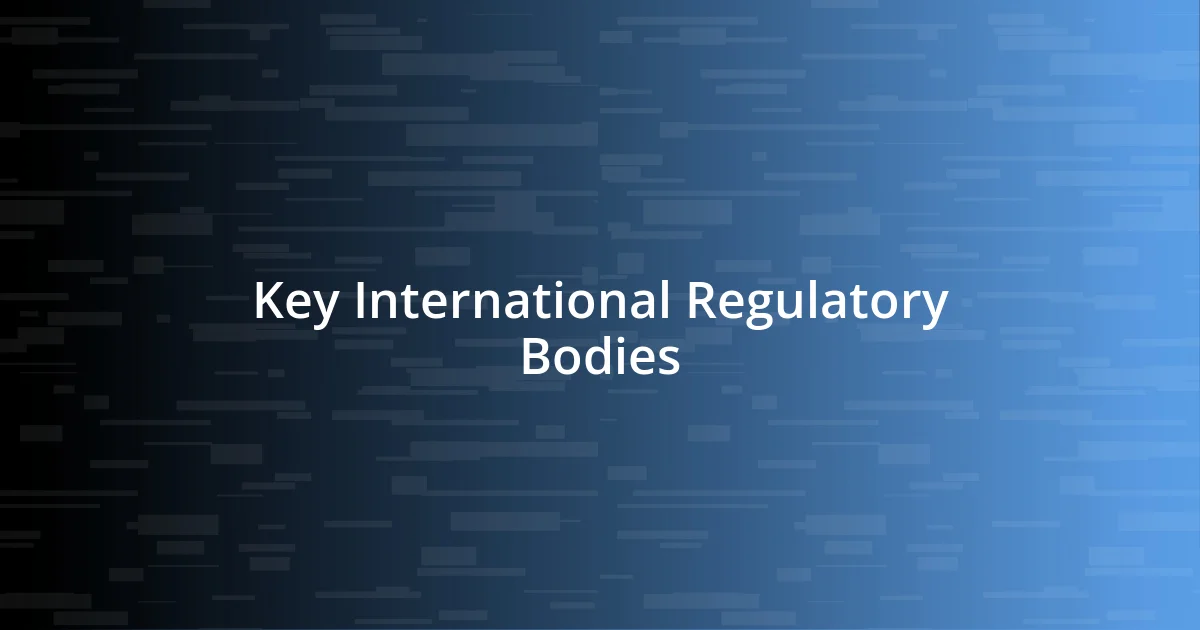
Key International Regulatory Bodies
Effective oversight and governance in the realm of international regulations hinge on several key regulatory bodies. These organizations play vital roles in establishing standards, facilitating trade, and maintaining compliance across borders. Reflecting on my experiences, I recall attending a meeting where representatives from various regulatory bodies discussed their challenges and successes. It became evident how pivotal their roles are in creating stability and fostering trust among member countries.
Here are some of the significant international regulatory bodies that shape global compliance:
- World Trade Organization (WTO): Oversees global trade agreements and ensures smooth trading processes between countries.
- International Organization for Standardization (ISO): Develops and publishes international standards to ensure quality, safety, and efficiency across industries.
- International Maritime Organization (IMO): Regulates shipping safety, environmental performance, and maritime security, leading to safer seas worldwide.
- Ethical Trading Initiative (ETI): Focuses on promoting respect for workers’ rights and improving working conditions in global supply chains.
- International Atomic Energy Agency (IAEA): Works towards promoting safe, secure, and peaceful nuclear technologies, enhancing global cooperation in nuclear regulations.
As I engaged more with these bodies, I recognized how each has a unique mission yet collaborates to ensure effective governance. It reminds me of how a well-functioning symphony brings together diverse instruments to create harmony. Moreover, adapting to the regulatory landscape can be challenging, but the insights gained from these interactions have been invaluable. I can’t help but feel inspired by the prospect of working towards shared objectives, particularly when it comes to promoting ethical practices and fostering a more sustainable global economy.
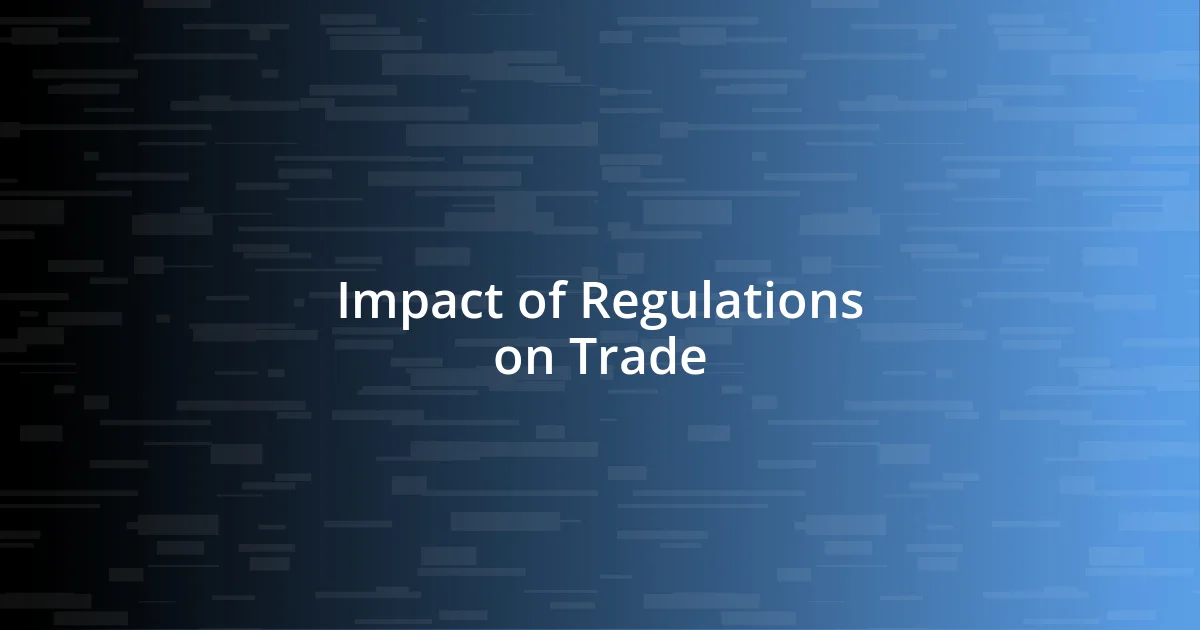
Impact of Regulations on Trade
Trade regulations can significantly influence how businesses operate, affecting everything from pricing to market access. Reflecting on a conversation I had with a colleague in the import/export business, he shared how changes in tariffs forced him to rethink his entire supply chain strategy. It was a tough lesson, showing how a single regulation can ripple through an organization, reshaping not just costs but also relationships with suppliers and customers.
Another aspect I’ve observed is the unpredictability regulations can introduce into international trade. I remember a project where we anticipated launching a product in a new market, only to be hit with unexpected compliance requirements. It delayed our timeline and required additional resources for adaptation. This made me realize: are we adequately prepared for regulatory shifts? Anticipating these changes can be the difference between thriving or merely surviving in a competitive landscape.
Moreover, I’ve seen how well-crafted regulations can create a level playing field. I once spoke with a small business owner who benefited immensely from new trade agreements that lowered barriers to entry. He described how, for the first time, he could compete against larger corporations on an equal footing. It made me think about how important it is for policymakers to consider the diverse needs of businesses—because when regulations support fair practices, everyone stands to benefit.
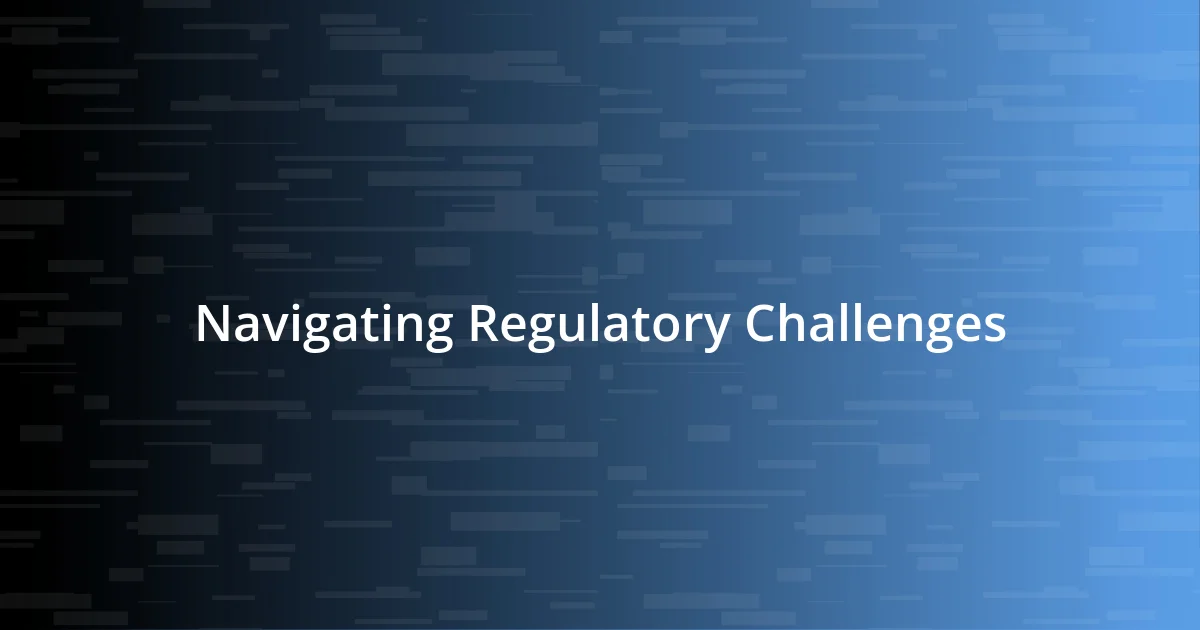
Navigating Regulatory Challenges
When navigating regulatory challenges, I often find myself reflecting on the importance of adaptability. I recall a time when a drastic regulatory shift in environmental standards caught my team off guard. The scramble to align our processes with the new rules was intense; however, it made me realize that having a flexible mindset can turn potential setbacks into opportunities for innovation and growth. Isn’t it fascinating how challenges can ignite creativity?
One of the key takeaways from my experiences is the importance of communication. I remember participating in a forum where diverse stakeholders discussed their perspectives on regulations. Their insights helped me see a well-rounded view of compliance—not just as a box to check, but as a conversation that shapes policies. It raised the question: how can we foster more dialogue among businesses and regulators to create smoother pathways to compliance?
Challenges often lead us into uncharted territory, and I’ve learned to embrace the unknown. There was a project where I needed to navigate a maze of regulations in a foreign market. Each twist and turn revealed new layers of complexity, testing my resolve. Yet, that journey not only expanded my understanding of international compliance but also reinforced the power of perseverance. Isn’t it remarkable how facing and overcoming these obstacles can lead to personal and professional growth?

Case Studies of Compliance Success
Compliance success stories often provide invaluable insights into how organizations can thrive under regulatory frameworks. For example, I once worked with a medium-sized tech company that revamped its compliance strategy after facing hefty fines due to data protection failures. They implemented a comprehensive training program that instilled a culture of compliance across all levels. Witnessing the shift in employee attitudes was remarkable; it felt like they transformed from seeing compliance as a burden to embracing it as a vital part of their mission. Isn’t it inspiring to see how a challenge can lead to a deeper commitment within a company?
In another instance, I observed a pharmaceutical company that excelled in compliance with international regulations by establishing a proactive approach to risk management. They created cross-functional teams that continuously monitored changes in regulations worldwide. This not only kept them ahead of the curve but also reduced their time to market significantly. I vividly remember discussing their strategies during a conference, where the enthusiasm in the room was palpable. It made me wonder: how many businesses are missing out on similar opportunities simply because they’re too reactive?
Lastly, I recall a non-profit organization that turned its compliance challenges into a success story by leveraging technology. They developed a digital platform to track and report their adherence to various funding and operational regulations. This innovation not only streamlined their processes but also built trust with their stakeholders, proving that compliance can be a strategic advantage. Have you ever considered how technology can transform compliance from a tedious task into a powerful tool for transparency and engagement?
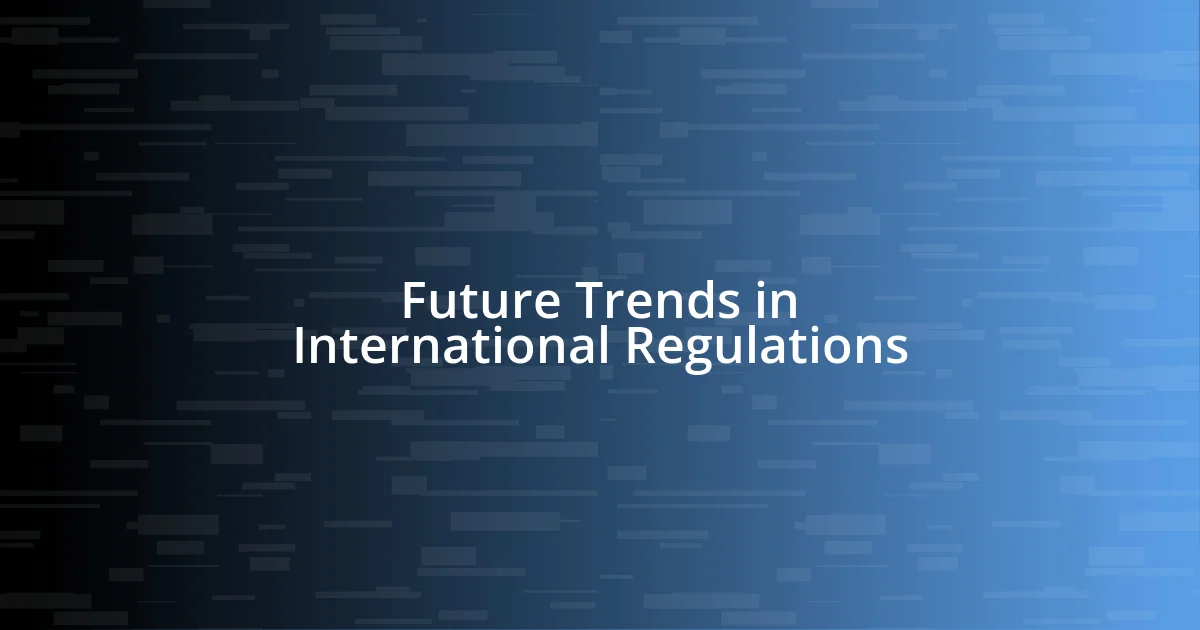
Future Trends in International Regulations
The landscape of international regulations is evolving rapidly, and I see a growing trend towards harmonization among countries. Recently, while attending a workshop on global trade regulations, I noticed how many nations are striving for unified standards to simplify compliance processes. Isn’t it interesting how a common regulatory framework could reduce the complexities facing businesses operating across borders?
I believe that technology will play a pivotal role in shaping future regulations. Just last year, I was involved in a project where we integrated compliance management software with our operational processes. The results were astounding; not only did it increase efficiency, but it also provided real-time insights into regulatory changes. Have you considered how digital tools can enhance your responses to evolving regulations, making compliance a more manageable task?
Another aspect that intrigues me is the shift towards greater transparency and stakeholder engagement in regulatory processes. During a recent panel discussion, regulators emphasized their desire to include businesses in policymaking dialogues. This commitment to collaboration resonated with me deeply. It makes me ponder, how can fostering such transparency lead to more robust and effective regulations that truly reflect the needs of all parties involved?












